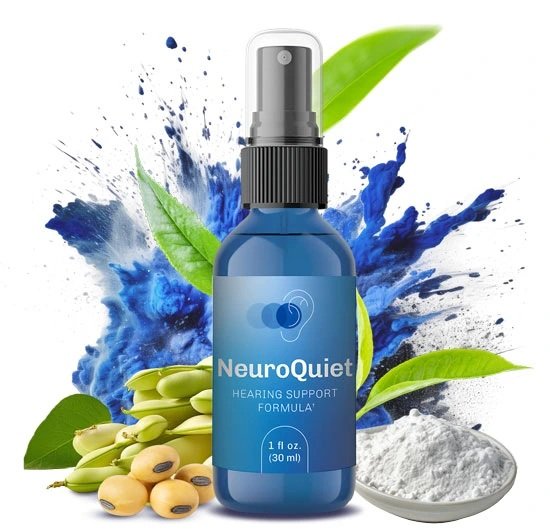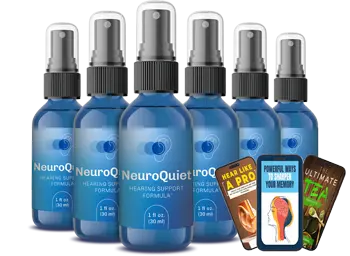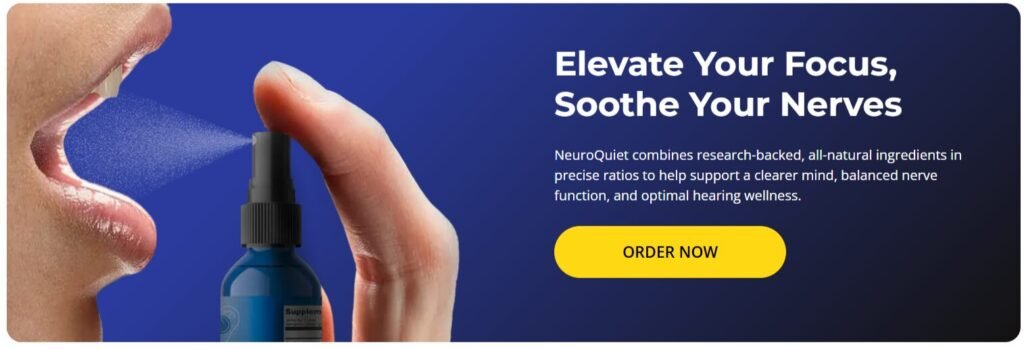Tinnitus, hearing difficulties, and cognitive decline are conditions that affect millions of adults worldwide, particularly as people move into their 40s, 50s, and beyond. The persistent ringing or buzzing in the ears (tinnitus) can be extremely frustrating, disturbing sleep, concentration, and quality of life. Meanwhile, age-related hearing decline and memory lapses are common concerns, fueling the booming market for natural supplements targeting both auditory and cognitive health.
One of the latest entrants in this space is NeuroQuiet, a liquid dietary supplement marketed primarily as a tinnitus relief aid and brain health booster. Unlike conventional capsules or tablets, NeuroQuiet is typically delivered as an oral spray, which promises faster absorption of its active ingredients. The product positions itself as a “360-degree hearing support” formula, claiming to help reduce tinnitus symptoms, improve hearing clarity, enhance mood, and support cognitive performance.
But with so many supplements making big promises, the critical question is: does NeuroQuiet live up to its claims? This NeuroQuiet Reviews takes a deep dive into NeuroQuiet’s formulation, scientific rationale, benefits, risks, user feedback, and market positioning. By the end, you’ll have a clear picture of whether NeuroQuiet is worth considering for tinnitus, hearing support, or general brain wellness.

The Growing Market for Hearing and Brain Supplements
Before dissecting NeuroQuiet, it helps to understand the context in which such products are thriving. Hearing loss affects over 1.5 billion people globally, with more than 430 million requiring rehabilitation services according to the World Health Organization (WHO). Tinnitus alone affects up to 15% of adults, often in conjunction with hearing impairment. Yet conventional medicine offers limited solutions ranging from hearing aids to cognitive-behavioral therapy without an outright cure for tinnitus.
Meanwhile, brain health has become a major focus of wellness culture. Nootropic supplements products that aim to enhance memory, focus, mood, and cognition are a rapidly expanding industry. Consumers are increasingly drawn to “natural” or “holistic” remedies that claim to address both hearing and cognitive decline, especially since these issues often overlap due to shared neural and circulatory pathways.
NeuroQuiet is marketed squarely at this intersection. By combining nootropic ingredients (for memory, focus, mood) with compounds thought to improve circulation, reduce oxidative stress, and calm neuronal hyperactivity, it positions itself as a two-in-one formula targeting both the brain and the ears.
NeuroQuiet: Product Overview
- Format: Liquid spray (sublingual administration under the tongue).
- Category: Dietary supplement.
- Primary Claims:
- Reduces tinnitus symptoms (ringing, buzzing, hissing in the ears).
- Improves hearing clarity and auditory sharpness.
- Enhances cognitive performance (memory, learning, focus).
- Promotes emotional balance, stress reduction, and better sleep.
- Target Audience: Adults experiencing tinnitus, hearing difficulties, brain fog, stress, or mild cognitive concerns generally aged 30 to 70+.
- Guarantee: Typically marketed with a 90-day money-back guarantee.
- Availability: Sold primarily through official websites; not widely found in pharmacies or retail chains.
Ingredient Analysis
The foundation of any supplement lies in its ingredients. Let’s examine NeuroQuiet’s core components, what the science says about them, and how they might relate to hearing and cognitive health.
1. Alpha-GPC (Alpha-Glycerylphosphorylcholine)
- Function: A choline donor that increases acetylcholine levels, a neurotransmitter vital for learning, memory, and cognition.
- Evidence:
- Multiple studies show Alpha-GPC may improve cognitive performance, especially in older adults with cognitive decline.
- In sports nutrition, it’s used for mental sharpness and physical endurance.
- Relevance to Hearing: Indirect, but by enhancing acetylcholine transmission, it may support neural communication pathways in the auditory cortex.
2. GABA (Gamma-Aminobutyric Acid)
- Function: The brain’s primary inhibitory neurotransmitter, promoting calmness and reducing neuronal hyperactivity.
- Evidence:
- Supplements with GABA have been associated with reduced stress, anxiety, and better sleep.
- Some tinnitus theories suggest hyperactivity of auditory neurons contributes to the phantom ringing; thus, boosting GABA activity could theoretically reduce symptoms.
- Relevance to Hearing: Supports the “calming” of auditory pathways.
3. L-Dopa Bean Extract (Mucuna Pruriens)
- Function: Provides L-Dopa, a precursor to dopamine, crucial for mood, motivation, and reward processing.
- Evidence:
- Traditionally used in Ayurvedic medicine.
- Known for supporting dopamine levels in Parkinson’s disease.
- Relevance to Hearing: Dopamine plays a role in auditory signal processing and emotional response to tinnitus.
4. Moomiyo (Shilajit)
- Function: A mineral-rich adaptogen with antioxidant and anti-inflammatory properties.
- Evidence:
- Used for centuries in traditional medicine for vitality and anti-aging.
- Modern studies highlight its role in reducing oxidative stress and boosting mitochondrial function.
- Relevance to Hearing: Since oxidative stress contributes to age-related hearing decline, antioxidants like shilajit may help protect auditory cells.
5. L-Arginine
- Function: Amino acid that boosts nitric oxide production, improving blood vessel dilation and circulation.
- Evidence:
- Widely studied for cardiovascular benefits.
- Better circulation may improve oxygen and nutrient delivery to auditory cells.
- Relevance to Hearing: Ear health depends heavily on microvascular circulation. Poor blood flow is linked to tinnitus and hearing impairment.
6. L-Tyrosine
- Function: Precursor to dopamine, norepinephrine, and epinephrine key neurotransmitters for stress response and cognitive performance.
- Evidence:
- Supports focus and resilience under stress (military and sleep-deprivation studies confirm this).
- May improve working memory and reduce stress-related performance decline.
- Relevance to Hearing: Stress is a major aggravator of tinnitus symptoms, so tyrosine’s role in stress resilience could be valuable.

Claimed Benefits of NeuroQuiet
Based on the ingredients and marketing materials, NeuroQuiet is said to provide a multi-pronged approach:
- Relief from Tinnitus: By calming auditory neurons (via GABA), supporting circulation (via L-Arginine), and reducing oxidative stress (via Shilajit).
- Improved Hearing Clarity: Through enhanced blood flow and neural communication (L-Arginine + Alpha-GPC).
- Cognitive Enhancement: Alpha-GPC, L-Tyrosine, and L-Dopa bean work together to boost memory, focus, and mental sharpness.
- Stress and Mood Support: GABA and dopamine precursors reduce anxiety and improve mood.
- General Vitality: Shilajit contributes to energy, immunity, and resilience.
Scientific Evidence: Does It Hold Up?
The scientific foundation for NeuroQuiet rests more on individual ingredient studies than on direct research into the formula itself. Here’s a breakdown:
- Alpha-GPC: Strong evidence for memory and cognition, especially in elderly populations.
- GABA: Mixed evidence for oral supplementation, since GABA poorly crosses the blood–brain barrier, but anecdotal reports suggest calming effects.
- Mucuna (L-Dopa): Clinically effective for dopamine support in Parkinson’s patients; less clear for healthy adults, but mood benefits are reported.
- Shilajit: Growing evidence supports its antioxidant and anti-inflammatory roles, though more high-quality human trials are needed.
- L-Arginine: Robust evidence for circulation and nitric oxide boosting; some small studies suggest benefits for auditory function.
- L-Tyrosine: Well-supported for cognitive performance under stress.
How Does NeuroQuiet Work?
NeuroQuiet is promoted as a natural supplement designed to address tinnitus, hearing concerns, and cognitive decline through a multi-faceted approach. Instead of targeting just one aspect of ear or brain health, it combines several mechanisms: enhancing circulation, calming overactive neurons, reducing oxidative stress, and supporting neurotransmitter balance. Together, these actions are said to provide relief from ringing in the ears, improve mental clarity, and support overall vitality.
1. Supporting Neurotransmitter Balance
One of NeuroQuiet’s key strategies is restoring balance to brain chemicals that influence both cognition and auditory processing. Ingredients such as Alpha-GPC and L-Tyrosine provide the building blocks for acetylcholine and dopamine, two neurotransmitters central to memory, focus, and stress resilience. GABA, the brain’s calming neurotransmitter, helps counteract neuronal overactivity, which is thought to contribute to tinnitus. By promoting a smoother flow of signals between nerve cells, NeuroQuiet aims to reduce the perception of “phantom sounds” while improving focus and mood.
2. Calming Auditory Hyperactivity
Tinnitus often results from hyperactivity in the auditory cortex—the brain’s sound-processing region. NeuroQuiet incorporates GABA to dampen this overactivity and promote a sense of calm. This mechanism doesn’t eliminate sound input but may help reduce the brain’s heightened response that creates the sensation of ringing or buzzing. Users often describe this as the tinnitus becoming “less noticeable” rather than disappearing completely.
3. Enhancing Blood Circulation to the Ears
The inner ear relies on a delicate network of blood vessels to deliver oxygen and nutrients to auditory cells. Poor circulation is linked to hearing loss and worsened tinnitus. NeuroQuiet uses L-Arginine, an amino acid that boosts nitric oxide production, relaxing blood vessels and improving microcirculation. By enhancing nutrient and oxygen delivery, NeuroQuiet may support healthier auditory cells and reduce stress on the hearing system.
4. Combating Oxidative Stress and Inflammation
Oxidative stress and inflammation are major contributors to age-related hearing decline and tinnitus. NeuroQuiet contains Shilajit (Moomiyo), a mineral-rich adaptogen with strong antioxidant properties. Shilajit helps neutralize harmful free radicals and reduce cellular inflammation, which may protect auditory nerve cells and support long-term hearing health. This antioxidant support also contributes to general vitality, energy levels, and immune strength.
5. Elevating Mood and Reducing Stress
Tinnitus is often aggravated by stress, and many sufferers experience anxiety, irritability, or sleep difficulties. NeuroQuiet tackles this with a dual approach:
- L-Dopa Bean (Mucuna Pruriens) provides dopamine support, enhancing mood, motivation, and resilience.
- GABA promotes relaxation and better sleep quality.
By addressing the emotional burden of tinnitus, NeuroQuiet helps users feel calmer, more balanced, and less fixated on intrusive sounds.
6. Holistic Brain and Ear Synergy
What sets NeuroQuiet apart is its positioning as both a hearing supplement and a nootropic. Rather than only focusing on the ears, it strengthens the brain’s role in processing auditory input. This synergy may explain why some users report clearer hearing, sharper thinking, and an improved ability to cope with tinnitus.
User Experiences and Reviews
As of 2025, NeuroQuiet has received increasing attention in wellness forums and supplement review sites. Common themes include:
- Positive Experiences:
- Many users report reduced perception of tinnitus after 3–6 weeks of use.
- Several note improved sleep quality, less irritability, and better focus.
- Some users feel more energized and emotionally balanced.
- Neutral/Mixed Experiences:
- A subset of users report no noticeable improvement in tinnitus but still mention general cognitive benefits.
- Some find the spray format inconvenient compared to pills.
- Negative Experiences:
- A small percentage cite mild digestive upset or headaches.
- A few users complain about high pricing and auto-ship policies from the official website.
As with most supplements, results vary widely. Tinnitus in particular is a complex, multifactorial condition, and no supplement is universally effective.
Safety, Side Effects, and Precautions
NeuroQuiet is marketed as safe and natural, but potential considerations include:
- Mild Side Effects: Digestive upset, headaches, jitteriness (possible with L-Dopa).
- Drug Interactions:
- L-Dopa can interact with Parkinson’s medications.
- L-Arginine may influence blood pressure and interact with nitrates.
- GABAergic supplements may compound sedative effects of certain drugs.
- Pregnancy/Breastfeeding: Not recommended due to lack of safety studies.
- Underlying Conditions: Those with heart disease, neurological disorders, or chronic illness should consult a doctor.
Overall, side effects appear mild, but professional consultation is recommended before starting.
Comparison with Alternatives
NeuroQuiet competes with several supplements targeting tinnitus and cognitive health:
- Synapse XT – Another tinnitus supplement with antioxidants and herbal extracts.
- Sonovive – Combines hearing support with nootropics, somewhat similar in positioning.
- Quietum Plus – Focused more on herbal extracts for ear health.
- Standalone Nootropics – Alpha-GPC, L-Tyrosine, or Shilajit can be purchased separately at lower cost.
Differentiator: NeuroQuiet’s liquid spray format may allow faster absorption, though not all users prefer this delivery method.
Pricing and Money-Back Guarantee
- Typical Cost: Varies, but often around $69 per bottle, with discounts for multi-bottle bundles.
- Guarantee: A 90-day money-back guarantee is usually offered, allowing risk-free trial.
- Purchase Options: Primarily through official websites, often not available in retail pharmacies.
The pricing is higher than buying individual ingredients but competitive with similar “tinnitus + brain health” blends.

Pros and Cons
Pros
- Multi-targeted approach (hearing + cognition).
- Contains several ingredients with solid scientific support.
- Liquid spray may improve absorption.
- Generally safe with few reported side effects.
- Backed by a 90-day guarantee.
Cons
- No direct clinical trials on NeuroQuiet formula.
- Relatively expensive compared to buying ingredients separately.
- Results vary widely, especially for tinnitus relief.
- Limited independent reviews; many sources are affiliate-based.
- Spray format not universally liked.
FAQs:
1. What is NeuroQuiet?
NeuroQuiet is a natural dietary supplement in spray form, designed to support tinnitus relief, hearing clarity, cognitive function, stress balance, and overall brain health using targeted nootropic ingredients.
2. How does NeuroQuiet work?
NeuroQuiet works by enhancing neurotransmitter balance, improving blood circulation, calming overactive auditory neurons, reducing oxidative stress, and supporting mood stability together addressing tinnitus symptoms, mental clarity, and overall auditory wellness.
3. Who can use NeuroQuiet?
NeuroQuiet is intended for adults, generally aged 30–70+, experiencing tinnitus, hearing difficulties, stress, or brain fog. It is not recommended for pregnant, breastfeeding, or medically vulnerable individuals without guidance.
4. How long before results appear?
Results vary. Some users notice reduced tinnitus and improved focus within weeks, while others require consistent use for two to three months before experiencing significant, sustained auditory and cognitive benefits.
5. Are there any side effects?
Most users tolerate NeuroQuiet well, though mild side effects like digestive discomfort, headaches, or restlessness may occur. Those with medical conditions should consult a healthcare professional before using.
6. Is NeuroQuiet FDA-approved?
No. NeuroQuiet is a dietary supplement, not an FDA-approved drug. It’s produced in FDA-registered, GMP-compliant facilities but isn’t certified to diagnose, treat, cure, or prevent medical conditions.
Must Read:
- ZenCortex Reviews: Can It Truly Boost Your Hearing Naturally?
- NeuroPrime Reviews: Brain Booster or Just Hype?
- SynaBoost Reviews: Is This Brain Booster Worth It?
Final Verdict:
NeuroQuiet is a thoughtfully formulated supplement that combines nootropic compounds with circulation enhancers and adaptogens, aiming to support both hearing health and brain function. The ingredients have credible scientific backing, particularly for cognition, stress resilience, and circulation, which are indirectly linked to auditory wellness. User feedback suggests genuine benefits for many individuals, especially in reducing tinnitus perception and improving mood.
However, it’s important to emphasize that NeuroQuiet is not a cure for tinnitus or hearing loss. Results are highly individual, and scientific validation for the complete formula is lacking. Those who view it as a supportive aid rather than a miracle solution are more likely to be satisfied.
For adults struggling with tinnitus, mild hearing difficulties, or “brain fog,” NeuroQuiet may be worth trying, particularly given its money-back guarantee. But it should ideally be part of a broader wellness strategy including stress management, hearing protection, and medical consultation when necessary.


